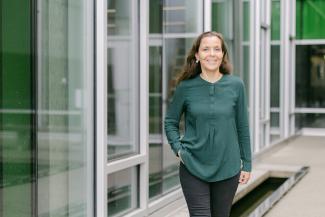
Andrea Hilland, KC is a Nuxalk scholar and powerful advocate for the resurgence of Indigenous laws and genuine reconciliation. On July 1, 2023, we were delighted to welcome her back to the Peter A. Allard School of Law as an assistant professor.
Professor Hilland brings a wealth of legal expertise to the law school. She’s advocated on behalf of First Nations to assert Aboriginal rights on environmental issues and advised organizations including the Law Society of BC, the Federation of Law Societies, the Canadian Bar Association of BC, the BC Human Rights Tribunal and the Continuing Legal Education Society of BC on Indigenous matters, including developing responses to the Truth and Reconciliation Commission's calls to action. An Allard Law alum, Professor Hilland also served as associate director of Indigenous Legal Studies from 2008-2012.
Here, she discusses her research, her approach to teaching and her work to support the resurgence of Indigenous laws.
Tell us about your research. What are you currently working on?
My research examines the intersections of Indigenous laws, Aboriginal rights, and environmental regulation to challenge discriminatory theories of colonial supremacy and Indigenous inferiority that are perpetuated through the contemporary colonial legal system. Key objectives of my research are to support the resurgence of Indigenous laws and to demonstrate the potential of Indigenous laws to enhance Canada's multi-juridical legal system.
This year you’ll be teaching Aboriginal Peoples and Canadian Law and Aboriginal and Treaty Rights in the fall and spring terms. What do you hope students take away from your courses?
I would like to highlight the shortcomings of the colonial legal regime's handling of Indigenous issues. I will encourage students to identify and challenge the colonial philosophies that underlie Canadian law, and to understand Indigenous strategies of resistance to colonialism, including challenges to and within the Canadian legal system. My hope is that students will develop their critical thinking skills and their confidence to engage with Indigenous legal issues and advocate for fundamental changes to the colonial legal system.
How would you describe your approach to teaching?
I have the humility to accept that I don't know everything, and that I am (and always will be) learning. I try to make the topics relatable at a personal level. The law involves people, so I really encourage students to go beyond legal principles and think about the individuals who are affected by the law.
At the Law Society of BC, you were actively involved in work to advance reconciliation. Among other work, you created the Indigenous Intercultural Course, which responds to the Truth and Reconciliation Commission’s call to action #27, calling upon Canadian law societies to ensure all lawyers receive cultural competency training. What do you see as the next big step for law societies to move towards genuine reconciliation?
Law societies need to conduct honest and critical evaluations of their legislation, regulations, and ethical codes to identify and remove colonial biases that underlie the regulation of lawyers. Rules actually need to be changed. Personal and systemic biases against Indigenous people need to be eradicated. Indigenous perspectives need to be incorporated into competence and ethics standards. Regulatory processes, such as investigations and hearings, need to integrate Indigenous approaches of inquiry and resolution, including trauma informed and non-adversarial methods.
You previously served as Associate Director of Indigenous Legal Studies and completed your LLB and LLM degrees at Allard Law, and the Allard community is excited to have you back! What inspired you to return?
A combination of factors led me back to Allard Law. First, there were a couple of big life changes – specifically, the passing of elders and leaders within my Nuxalk extended family – that made me reflect on the limitations of my work within the confines of a very colonial institution. Second, my community, the Nuxalk Nation, continually asserts Nuxalk laws to resist the imposition of colonial laws in Nuxalk territory, and I would like to support them in their efforts. And third, a lot of work is being done in the academic realm (including, of course, at Allard Law) to support the resurgence of Indigenous laws, and I want to meet and work with Indigenous communities to contribute to this work.
What kind of long-term change do you hope to see through your teaching? What do you hope to instill in future lawyers?
The Truth and Reconciliation Commission's Calls to Action emphasized the foundational role of education in reconciliation, and that truth comes before reconciliation. Lawyers need to understand how Canadian law has harmed, and continues to harm, Indigenous people. Lawyers need the humility to acknowledge the shortcomings of Canadian law. They also need to appreciate the privileged position that lawyers hold to identify and remove systemic biases within the legal system. My hope is to inspire future lawyers to be truly empathetic and committed to correcting colonial injustices.

